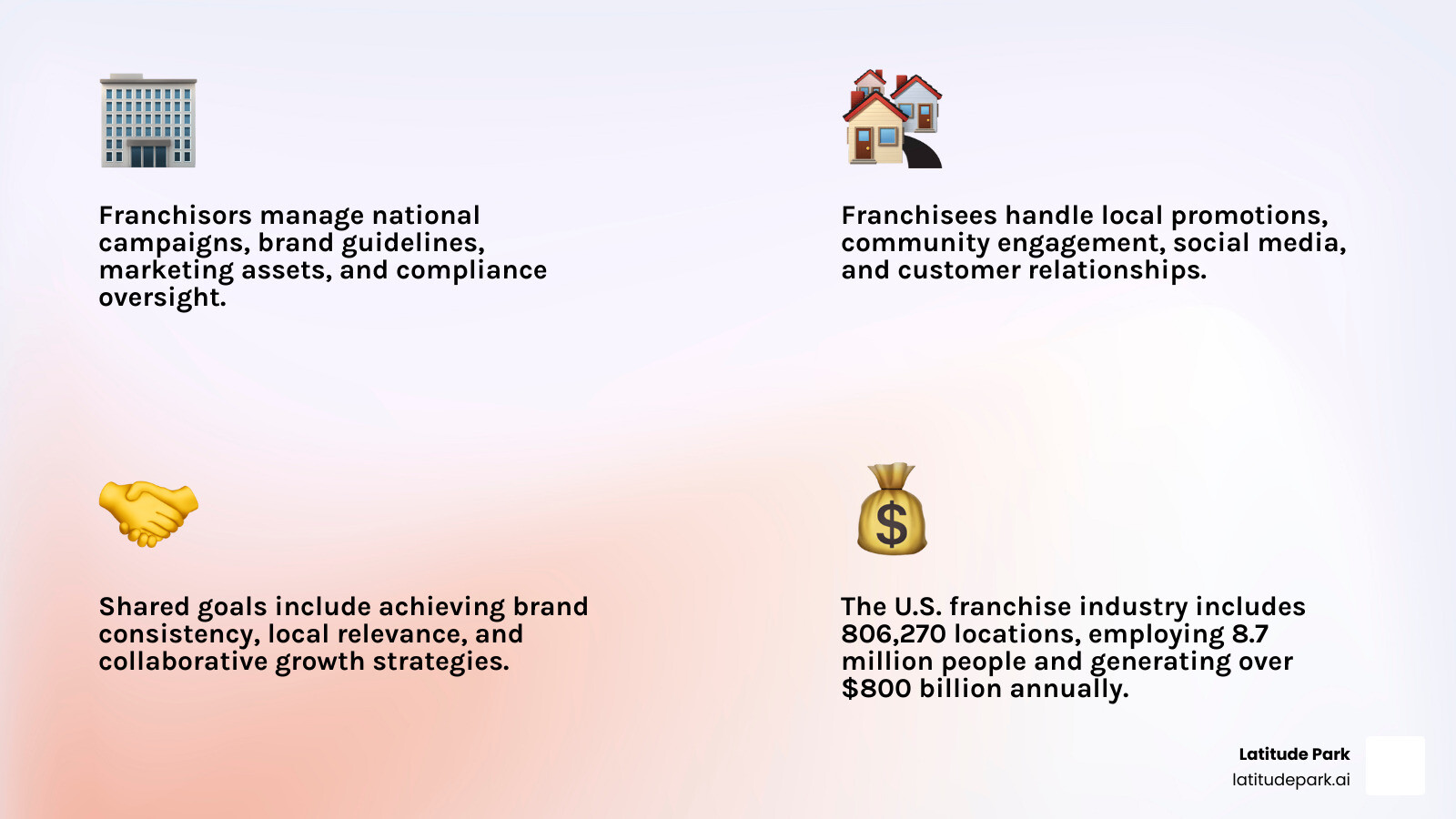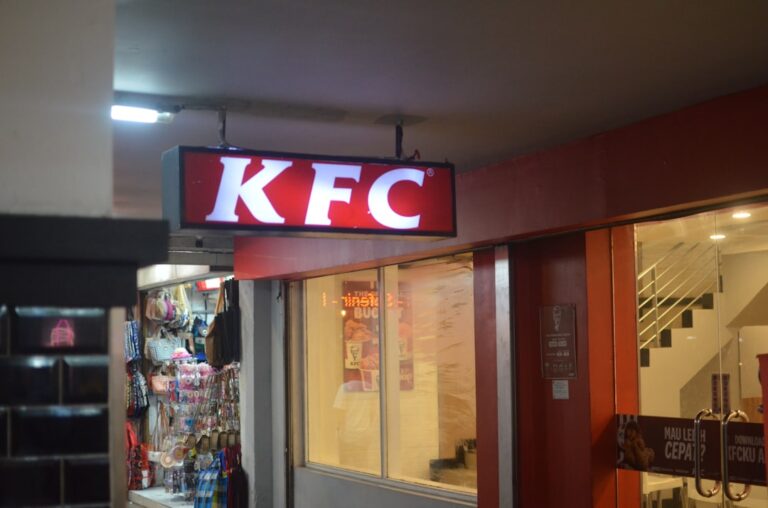Why Franchise Marketing is Essential for Multi-Location Success
Franchise marketing is the strategic promotion of a brand across multiple franchise locations. It requires careful coordination between franchisors (handling national campaigns and brand guidelines) and franchisees (managing local promotions and customer relationships) to drive growth while maintaining a consistent brand message. Unlike independent business marketing, it involves balancing national brand consistency with local market customization.
Key Components of Franchise Marketing:
- Franchisor responsibilities: National campaigns, brand guidelines, marketing assets, compliance oversight
- Franchisee responsibilities: Local promotions, community engagement, social media management, customer relationships
- Shared goals: Brand consistency, local relevance, collaborative growth strategies
The franchise industry is a major economic force, with approximately 806,270 franchises in the U.S. employing 8.7 million people and generating over $800 billion annually. This scale makes effective marketing coordination critical, especially when 90% of consumers search online before making a purchase. Franchise marketing managers must create scalable digital strategies that work across diverse local markets.
A successful approach supports both franchise development (attracting new franchisees) and local store marketing (driving customers to existing locations). This unified strategy combines the power of national brand recognition with the authenticity of local community engagement.
As Rusty Rich, President and founder of Latitude Park digital advertising agency, I’ve spent over 15 years helping franchises steer multi-location franchise marketing. My experience has shown that the most successful franchises master the balance between corporate oversight and local flexibility.

Basic franchise marketing glossary:
The Dual Role: Franchisor vs. Franchisee Responsibilities
Think of franchise marketing as a partnership where the franchisor sets the brand’s overall rhythm and franchisees add their local flair. When both partners understand their roles, the result is marketing that drives growth across every location.

This partnership balances brand consistency with local relevance, ensuring customers have a high-quality experience everywhere, yet each location feels connected to its community. This often comes together through co-op advertising programs, where resources are pooled for regional campaigns. Neither partner can succeed alone; franchisors provide the framework, and franchisees bring the local insights. For a deeper dive, see our guide on Franchise vs. Corporate Marketing: How to Balance Brand and Local Strategy.
The Franchisor’s Role: National Brand Building
As the brand’s guardian, the franchisor’s primary mission is developing the national brand strategy to build recognition and trust. This involves launching large-scale campaigns and creating high-quality marketing assets like logos, ad copy, and video templates for franchisees to customize.
A key responsibility is providing the tools and platforms for franchisee success, such as marketing portals or CRM systems. Most importantly, the franchisor must ensure brand compliance through clear guidelines covering everything from logo usage to tone of voice. This includes adhering to Federal Trade Commission’s (FTC) regulations, especially when recruiting new franchisees.
The Franchisee’s Role: Local Market Domination
Franchisees are the on-the-ground experts who bring the brand to life. Their strength lies in local promotions custom to their community, like a back-to-school special or a promotion tied to a local festival. Community engagement is where franchisees shine, sponsoring local teams or hosting events to build authentic loyalty.
Local social media management allows franchisees to respond to customers in real-time and showcase their location’s unique character, all while adhering to brand guidelines. Their customer relationship management (CRM) efforts turn one-time visitors into fans by personalizing the experience. To avoid common issues, see our guide on 9 Common Franchise Marketing Mistakes and How to Avoid Them.
Fostering Communication and Collaboration
The secret to successful franchise marketing is seamless collaboration.
- Set clear practices from the start so everyone knows what requires corporate approval.
- Share data and results regularly to keep everyone aligned and share learnings across the system.
- Hold regular marketing check-ins to discuss challenges, brainstorm ideas, and strategize together.
- Celebrate local wins system-wide to encourage initiative and positive reinforcement.
- Create a feedback loop where local intelligence informs national strategy and corporate support empowers local success.
Crafting Your Winning Franchise Marketing Plan
Creating a successful franchise marketing plan requires a solid foundation, a clear blueprint, and attention to detail. Strategic planning, goal setting, and smart budgeting form the backbone of every winning franchise marketing strategy.

Your marketing plan is the GPS for your franchise journey, balancing national brand power with local market authenticity. This strategic approach ensures every marketing dollar works harder, driving both brand awareness and foot traffic. For deeper insights, check out our guide on The Power of Consistent Branding Across Franchise Locations.
Ensuring Brand Consistency Across All Locations
Consistency is crucial for franchise success. When customers see your logo, they should immediately know what to expect. This brand recognition builds trust, and research shows 71% of consumers are more likely to buy from a brand they recognize.
The key is comprehensive brand guidelines covering logos, colors, and tone of voice. These aren’t meant to stifle creativity but to keep everyone moving in the same direction. Smart franchisors provide ready-to-use templates for social media posts or flyers, allowing franchisees to customize content for their local market while staying perfectly on-brand.
Key Elements of a Local Franchise Marketing Plan
Every location needs a custom marketing roadmap. A strong local franchise marketing plan includes:
- Identifying your local target audience: Understand who lives in your area and what they care about to make marketing feel personal.
- Competitor analysis: Know who you’re up against to find gaps you can fill.
- Setting SMART goals: Turn vague hopes into concrete targets, like “increase new customers by 20% this quarter.”
- Choosing the right marketing channels: Test and measure to find where your local audience engages most, whether it’s Instagram, Facebook, or email.
- Budget allocation: Have a clear plan for how marketing dollars are spent to maximize impact.
- Key Performance Indicators (KPIs): Track metrics like website visits, lead generation, and sales to measure what’s working and guide future decisions.
Core Digital Franchise Marketing Strategies
Having a strong online presence isn’t optional—it’s essential. The most successful franchises accept a comprehensive digital approach across multiple channels, allowing them to work on both national and local levels simultaneously.

Digital franchise marketing provides a wealth of data, offering real-time insights into what’s working. This allows you to adjust your approach quickly and invest marketing dollars where they’ll have the biggest impact. For a comprehensive look at maximizing your online efforts, explore our guide on Digital Marketing Strategies for Franchises: Maximizing Online Success.
Search Engine Optimization (SEO) for Local Findy
When people need something, they search online, making SEO the foundation of franchise marketing. Franchises manage two types: National SEO (handled by the franchisor for broad terms) and Local SEO (where franchisees target “near me” searches).
The secret weapon for local SEO is an optimized Google Business Profile. Ensure every location’s profile is complete and accurate. Consistency in your business name, address, and phone number across all online directories is crucial. Use location-specific keywords naturally in your content, like blog posts about local events. With almost 59% of global web traffic comes from mobile devices, your website must be mobile-friendly to rank well and provide a good user experience. For more, see our guide to SEO for Franchise Websites.
Social Media and Content Marketing
Social media is where your franchise builds connections. Choose the right platforms where your audience spends their time. A two-tier social media approach works best: corporate pages share brand news, while franchisee-run local pages share behind-the-scenes content and engage with the community.
Your content strategy should aim to educate, entertain, and engage, not just sell. Paid social advertising, like Meta (Facebook) Ads, allows for hyper-local targeting around each location. Consider partnering with local micro-influencers—people with smaller, highly engaged local followings—for authentic brand introductions. To maximize your impact, explore our strategies for Franchise Social Media Growth.
Email Marketing and Lead Generation
Email marketing remains a reliable performer in franchise marketing, building relationships and driving revenue. Build a subscriber list by offering value, like a discount or exclusive content. Use email sequences to nurture leads, staying top-of-mind with educational content or success stories.
Personalization and segmentation are key; send targeted campaigns based on customer behavior or preferences. Promotional emails should feel like insider information, creating a sense of urgency and belonging. Measure success with open rates, click rates, and conversions to continuously refine your approach. Master lead generation with our Franchise Lead Generation Strategies guide.
Measuring Success and Managing Your Reputation
In franchise marketing, success isn’t a feeling—it’s something you measure, track, and improve. Without clear metrics, you’re flying blind. A data-driven approach helps you understand what resonates with customers, allowing you to continuously refine your strategies for better results.

The franchises that thrive are those that stay nimble, adapting their marketing based on real performance data rather than gut feelings. For more insights on staying ahead, check out our article on the Importance of Digital Presence for Franchises 2025.
Online Reputation Management
Your online reputation is your digital first impression. With 90% of customers regarding online reviews as personal recommendations, managing it is critical.
Encourage positive testimonials by training staff to ask happy customers for a review. Make it easy with direct links to your review profiles. Crucially, respond to both positive and negative feedback. A thoughtful response to a complaint shows you care and can strengthen your reputation. Finally, manage your listings on platforms like Google and Yelp to ensure information is consistent and builds trust.
Measuring Your Franchise Marketing ROI
Return on Investment (ROI) is the ultimate test of your franchise marketing. You need to track how marketing activities translate into revenue.
- Track website traffic and lead sources to see which channels are your workhorses.
- Monitor conversion rates to see how well your messaging resonates with customers.
- Calculate Customer Lifetime Value (CLV), the total revenue you can expect from a customer over time. This is a vital metric for long-term success.
Use analytics tools like Google Analytics and CRM platforms to track these metrics. Regular data review helps you allocate your budget more effectively.
| Brand Awareness Focus | Lead Generation Focus |
|---|---|
| Website traffic, unique visitors, bounce rate | Conversion rate, lead source analysis |
| Social media impressions, reach, follower growth | Email click-through rates, list growth |
| Brand mentions, sentiment tracking | Customer Acquisition Cost, Customer Lifetime Value |
Adapting Your Franchise Marketing Strategy
The best franchise marketing strategies are living documents. Monitor market trends to anticipate where your customers are heading. Be prepared to respond to changing customer preferences by testing new channels or messaging strategically.
Accept new technologies like AI or chatbots if they solve a real problem for your customers or improve efficiency. Maintain flexibility in your plan by building in regular review periods and being willing to shift resources based on performance data. The goal is to stay relevant without chasing every trend. For cutting-edge ideas, see our guide to Innovative Franchise Marketing Strategies 2024.
Frequently Asked Questions about Franchise Marketing
Diving into franchise marketing can be complex. Here are straight answers to the most common questions we hear from franchise owners.
How does franchise marketing differ from marketing an independent business?
The biggest difference is that franchise marketing is a team sport. A national brand (the franchisor) sets the overall strategy, while local owners (franchisees) execute marketing that connects with their communities. This requires balancing brand consistency with local customization. Independent businesses have total creative freedom but lack the established brand recognition and shared marketing resources that give franchises a powerful head start.
What is a franchise marketing fund?
A franchise marketing fund is a collective pool of money that all franchisees contribute to, usually as a small percentage of their sales. The franchisor manages this fund to pay for large-scale national advertising campaigns, professional marketing materials, and regional promotions. This system allows the brand to compete on a national level, giving every franchisee access to marketing efforts they could never afford alone while ensuring professional quality and brand consistency.
How much marketing autonomy do franchisees have?
This varies dramatically between franchise systems and is a critical question to ask before investing. Some franchisors maintain tight control with pre-approved campaigns, while others offer more freedom for local initiatives within brand guidelines. The most successful brands find a sweet spot, empowering local owners with professional tools and templates rather than just restrictions. Be sure to ask about their specific marketing policies to see if the system is a good fit for your entrepreneurial style.
Conclusion: Unifying Your Brand for Growth
Successful franchise marketing isn’t about choosing between national brand power and local connection—it’s about masterfully blending both. When national campaigns build brand recognition and local efforts create genuine community bonds, your impact multiplies. A customer might find you from a national ad but become a loyal fan because of the personal service at their neighborhood location.
This partnership thrives when franchisors provide clear guidelines and tools, and franchisees bring their local market knowledge. It creates a powerful feedback loop where local insights inform national strategy, and national support empowers local success.
At Latitude Park, we specialize in this collaborative approach. For over 15 years, we’ve helped franchises steer multi-location marketing by creating custom advertising structures. Our expertise lies in developing scalable Meta advertising strategies that feel personal and relevant to each local market. We understand that franchise marketing isn’t one-size-fits-all, so we craft custom solutions to ensure your brand resonates powerfully everywhere.
Ready to unify your brand for growth? Explore our franchise marketing resources to see how we can help your franchise thrive.









